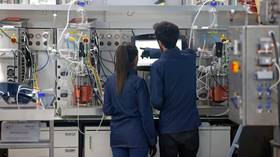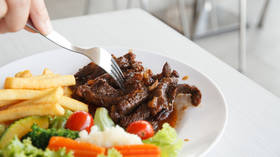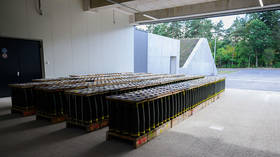First country approves artificial meat for pets – FT

A British company has announced that it will begin selling artificial chicken to pet-food producers this year, making Britain the first country in Europe to commercialize ‘lab-grown’ meat.
Owen Ensor, the CEO and co-founder of the start-up firm Meatly, said on Wednesday that the business has received approval for its products from the Animal and Plant Health Agency (APHA) and the Department for Environment, Food and Rural Affairs.
Meatly was able to capitalize on a window of opportunity created by Brexit, which freed the UK from EU regulations. It also benefited from the recent government focus on biotech and innovation, which saw its cultivated meat get the greenlight, Ensor told the Financial Times.
According to the entrepreneur, the “very exciting” thing about the approval is that “it shows the intention of the UK to be positioned as a leader in these new innovative fields and in food technology.”
The deputy director of food policy at UK’s Food Standards Agency, James Cooper, said the organization “welcomes innovations by the animal feed sector for using alternative materials such as cell-cultivated products (CCP) if this is done safely and as required by law.”
Ensor believes pet food will become the natural starting point for the cultivated meat market in Britain.
A Meatly spokesperson told Just Food website that, despite the company currently being “primarily focused on pet food,” its processes and products are safe and healthy for humans. “We will likely license our industry-leading technology to human food companies,” they said.
Meatly, which has so far raised £3.5 million ($4.6 million) from investors including US venture capital firm Agronomics and UK pet-food retailer Pets at Home, said it expects to reach industrial volumes within the next three years.
According to the spokesperson, the company will now try to establish itself in the US, Canadian, and EU markets “for pet food initially.”
The cultivated or cultured meat, which is made from animal cells grown in vats, is currently approved for human consumption in the US, Singapore, and Israel.
The EU has not yet made a decision on ‘lab-grown’ meat, but Italy, France and Austria have already said they will ban such products, even if they are allowed by the bloc.
Opponents of cultivated meat argue that its long-term health effects have not yet been studied, that it puts livestock in danger, and that it requires so much energy to produce that it would end up doing more ecological damage than animal farming.













